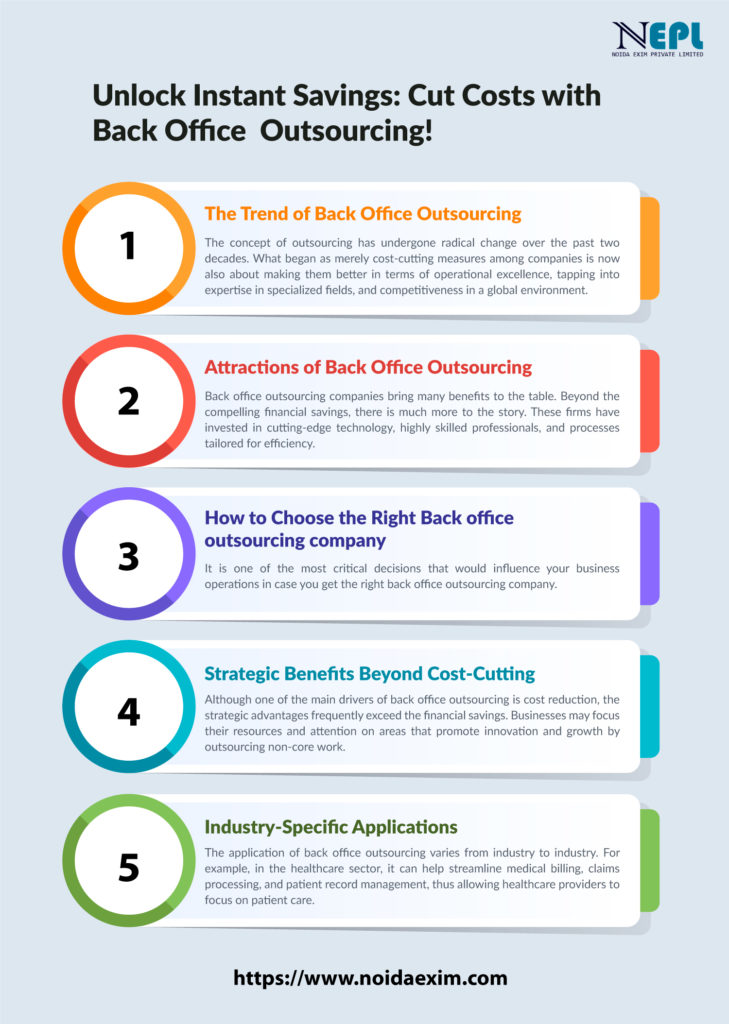One strategy that is fast gaining momentum across industries is back office process outsourcing. Businesses can outsource routine yet critical administrative tasks to dedicated Back office outsourcing companies so that they can focus on core activities, enhance efficiency, and save significant resources.
The Trend of Back Office Outsourcing

The concept of outsourcing has undergone radical change over the past two decades. What began as merely cost-cutting measures among companies is now also about making them better in terms of operational excellence, tapping into expertise in specialized fields, and competitiveness in a global environment.
Back office functions, which include data entry, payroll management, accounts payable and receivable, and customer service support, are important for any organization to run smoothly. However, these tasks generally require a lot of time and resources, diverting attention away from strategic initiatives. An effective back office outsourcing company can fill this gap by efficiently handling these responsibilities with precision and cost-effectiveness.
The reason for growing outsourcing trends in these tasks emanates from the fact that certain specialized outsourcing firms can do them efficiently, quickly, and relatively cheaper than in-house team members. Businesses in their sectors—be it in the startup or multinational forms—are using Back office outsourcing companies to increase their bottom-line and operational capabilities.
Attractions of Back Office Outsourcing
Back office outsourcing companies bring many benefits to the table. Beyond the compelling financial savings, there is much more to the story. These firms have invested in cutting-edge technology, highly skilled professionals, and processes tailored for efficiency. Take the case of a data management company specializing in back office outsourcing. Its use of AI-driven tools may enable faster and more accurate processing and analysis of data compared to an in-house generalist team.
Another advantage of outsourcing is that it allows businesses to scale their operations easily. Outsourcing partners can swiftly adjust to a company’s rapid growth or seasonal swings, guaranteeing continuous assistance.
For small and medium-sized businesses (SMBs), who might not have the funds to employ and train sizable in-house teams, this scalability is especially important. SMBs may obtain top-notch services without having to pay for full-time employees by outsourcing back office work.
Factors to Consider Before Outsourcing
Even though back-office outsourcing has many advantages, it’s important to understand the drawbacks and plan. The fear of losing control over important processes is the most commonly mentioned worry. Businesses need to establish effective communication channels and performance measures with their outsourcing partners and ensure that these align with organizational goals.
Another consideration is data security. In many back office operations, the company handles information that could be considered private and confidential, such as client information and financial records. This requires selecting a back office outsourcing firm that has strict measures on data security for the safe protection of the same information.
Lastly, cultural differences and time zone variations can be a problem when working with offshore outsourcing companies. Building a good partnership and mutual understanding can be beneficial in overcoming these obstacles.
How to Choose the Right Back office outsourcing company
It is one of the most critical decisions that would influence your business operations in case you get the right back office outsourcing company. Begin with defining your specific needs and objectives. Do you need cost-cutting, increased efficiency, or access to special expertise? Your priorities will be what guides your selection.
Next, do background checks on possible outsourcing partners. Look for businesses with a track record of success, stellar customer reviews, and industry knowledge. A reputable back office outsourcing business should also be open and honest about its service-level agreements, pricing, and procedures.
Another crucial factor to consider is evaluating the outsourcing company’s technology and tools. Companies that make use of cutting-edge technology are well-positioned to supply services in an effective and superior manner. Lastly, avoid discounting the value of cultural fit and communication. Strong partnerships are based on understanding each other and working together so, look for a partner that complements your business values and your communication style.
Strategic Benefits Beyond Cost-Cutting
Although one of the main drivers of back office outsourcing is cost reduction, the strategic advantages frequently exceed the financial savings. Businesses may focus their resources and attention on areas that promote innovation and growth by outsourcing non-core work.
For example, businesses may concentrate on product development, marketing, and consumer interaction by outsourcing administrative tasks. Improved competitiveness and a quicker time to market for new goods and services will result from this change in emphasis. A third reason is that Back office outsourcing companies bring in expertise often impossible to reproduce internally. They can increase precision and speed, and guarantee higher-quality results, and all this can result in increased customer satisfaction and brand reputation.
Industry-Specific Applications
The application of back office outsourcing varies from industry to industry. For example, in the healthcare sector, it can help streamline medical billing, claims processing, and patient record management, thus allowing healthcare providers to focus on patient care.
Outsourcing back office functions like accounting, compliance, and risk management is the way forward for financial services companies to manage complex regulatory environments while keeping the operational cost of the business down. In e-commerce, similar advantages can be achieved in managing high volumes of transactions through outsourcing inventory management, order processing, and customer support.
Even the creative industries like media and entertainment can benefit from back office outsourcing for content distribution, rights management, and royalty calculation. The diversity of outsourcing solutions makes them an essential tool for any business, regardless of its industry.
Advancement of technology, therefore, brings about broadening the scope and widening the horizon in the matter of back office outsourcing. Artificial intelligence (AI), machine learning (ML), and Robotic Process Automation (RPA) already transformed the outsourcing landscape by enabling a faster, more accurate, and cheaper solution from a back office outsourcing company.
This will translate to more sophisticated services offered at competitive prices for businesses. The use of technology further enables the customization of offerings by outsourcing partners, hence tailored for specific client needs.
Nearshoring is another emerging trend—outsourcing to countries geographically closer to the client’s location. This reduces time zone differences and cultural barriers while retaining the cost advantages of outsourcing.
Final Thoughts
Outsourcing back office operations is a potent tactic for companies trying to reduce expenses, boost productivity, and maintain their competitiveness in a market that is becoming more and more difficult. Organizations may access specialist knowledge and creative solutions while also unlocking immediate savings by collaborating with the best back office outsourcing company.
However, careful preparation and effective communication are necessary
for successful outsourcing to create a solid relationship that reflects
unambiguous promises. In this manner, companies may profit from this
revolutionary strategy for sustained success in a changing global market.

